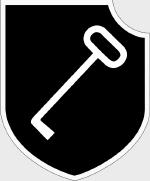The Motor Pool TMP7001 German Sd. Kfz. 181 PzKpfw VI Tiger I Ausf. E Heavy Tank - 1.SS Panzer Division "LSSAH" (1:35 Scale)
"The gun and armor of the Tiger were superb, making it in many ways the most formidable tank in service. Even so, it was poor in maneuver, it was slow, and its turret was a slow traverser in action. It was a tank which was, at its best, immobile in ambush, when its killing power was very frightening."
- Douglas Orgill, "German Armor"
 The German Waffenamt issued an order to design the VK4501(H) (as the PzKpfw VI Ausf E was then known) in May 1941, just one month prior to the commencement of Operation Barbarossa. Interestingly, Henschel und Sohn of Kassel was charged with building the heavily armored chassis while Krupp, by far the largest munitionwerks in Germany, was given the task of developing the turret. The PzKpfw VI Ausfuhrung E (type E) was one of the first German tanks to feature a torsion bar with eight interleaved wheels, which was designed to support the mammoth 57-ton tank. The Ausf E mounted a huge 8.8cm KwK36 L/56 cannon and featured two MG34 machine guns for close support against enemy infantry. By war's end, 1,354 vehicles had been produced, some rolling off the Wegmann assembly line.
The German Waffenamt issued an order to design the VK4501(H) (as the PzKpfw VI Ausf E was then known) in May 1941, just one month prior to the commencement of Operation Barbarossa. Interestingly, Henschel und Sohn of Kassel was charged with building the heavily armored chassis while Krupp, by far the largest munitionwerks in Germany, was given the task of developing the turret. The PzKpfw VI Ausfuhrung E (type E) was one of the first German tanks to feature a torsion bar with eight interleaved wheels, which was designed to support the mammoth 57-ton tank. The Ausf E mounted a huge 8.8cm KwK36 L/56 cannon and featured two MG34 machine guns for close support against enemy infantry. By war's end, 1,354 vehicles had been produced, some rolling off the Wegmann assembly line.
Now The Motor Pool is proud to offer this stunning 1:35 scale diecast replica of the PzKpfw VI Tiger Ausf E. heavy tank, which is handpainted in a Norman camouflage scheme and 'muddied' to give it a more weathered appearance. This particular Tiger tank was attached to the 1. SS Panzer Division "LSSAH" when it fought in Normandy in the summer of 1944.
Sold Out!
Dimensions:
Length: 10-inches
Width: 4-inches
Height: 4-inches
Historical Account: 1.SS-Panzer Division Leibstandarte Adolf Hitler (LAH) was formed on March 17th, 1933, by Josef "Sepp" Dietrich, Hitler's bodyguard, on the order of der Fuhrer who wanted a full-time armed force that was completely loyal to him. It was attached to Heeresgruppe Sud during the invasion of Poland and later took part in the invasion of France and the Low Countries. For the most part LAH was held in reserve although it was employed against retreating British troops trapped at Dunkirk. After the British capitulation, it was attached to XIV Armeekorps during the second and final phase of the invasion of France. Following the armistice, LAH was upgraded to a brigade and began training for the planned invasion of Britain (Operation Seelowe). When the invasion was cancelled, LAH was transferred to Romania for the Balkan invasion. It fought its way through Yugoslavia and Greece chasing Allied troops to Kalamata, where they were evacuated by sea to Crete. LAH was attached to Heeresgruppe Sud during the initial stages of Operation: Barbarossa, seeing action at Kiev and again at the Black Sea port of Rostov. It was transferred to France for refitting in 1942 and was upgraded again, this time to a Panzergrenadier Division. It returned to the Eastern front the following year, fighting at Kharkov and then at Kursk during Operation: Zitadelle. After Kursk, LAH was sent to Italy to perform anti-partisan duties but was soon returned to the Eastern front, this time as a full-fledged Panzer Division. Following the debacle at Kamenets-Podolsk, it was sent to France for rest and refit.
LAH fought in Normandy following the Allied invasion and saw action at Caen, Falaise, and Aachen as it fell back on the German frontier. It participated in the Ardennes counteroffensive (Operation "Wacht am Rhein") where it was attached to I SS Panzerkorps. Later on, LAH was sent back to the Eastern front to help break the siege of Budapest (
Unternehmen Margarethe). Afterwards, it was transferred to Austria where it surrendered to American troops at war's end.


